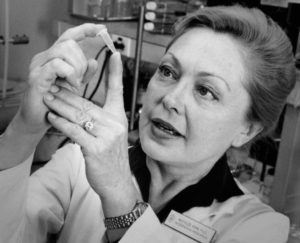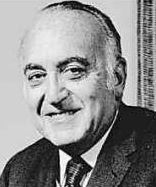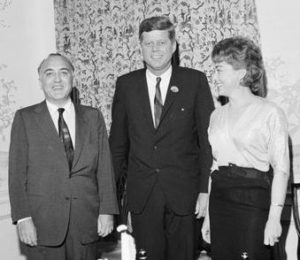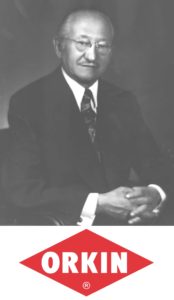Owner of the Toronto Raptors and Maple Leafs
 Lawrence M. Tanenbaum (b. 1945) was born in Toronto, the grandson of religious Polish-Jewish immigrants. His father was a real estate tycoon and the founder and owner of York Steel Construction. Tanenbaum studied economics at Cornell University, where he managed the school’s hockey team. Upon graduating, he became the general manager of Kilmer Van Nostrand, a construction company that his father had recently bought out. Tanenbaum expanded the company rapidly. Among their many projects across the Americas are the Toronto, Atlanta, Miami, and Calgary train and subway networks. After a merger with another company in 1984, Tanenbaum became the CEO of Canada’s largest road paving company. Meanwhile, he created two new subdivisions for Kilmer: its Developments wing which is a leading Canadian real estate firm, and Kilmer Sports, for which Tanenbaum is most famous. Kilmer Sports has a 25% share of Maple Leafs Sports & Entertainment Ltd., and Tanenbaum is the chairman of both the Toronto Maple Leafs hockey team and the Toronto Raptors basketball team. The former is among the most valuable sports clubs in the world, while the latter won the NBA Championship last week for the first time in its history. In fact, Tanenbaum played an instrumental role in bringing a professional basketball team to Toronto. Although he lobbied the NBA for years, the contract was ultimately awarded to another businessman. Undeterred, Tanenbaum vowed to buy it out, and did so in 1998 with the team having struggled tremendously in its first years. Tanenbaum quickly turned its fortunes around (together with Vince Carter, who was drafted that same year.) Tanenbaum is a big sports fan himself, and goes to as many Leafs and Raptors games as he can. MLSE also owns the Toronto Argonauts, Toronto FC, and two more teams, making it Canada’s largest sports company, and one of the largest in the world. Last year, Tanenbaum (with a partner) bought the rights to bottle and distribute Coca-Cola in Canada. Tanenbaum and his family are huge philanthropists, donating countless millions to schools, hospitals, and charities. Among his largest donations are $60 million to Toronto’s Mount Sinai Hospital, $20 million to Montreal’s Neurological Institute and Hospital, $5 million to the University of Toronto, and $50 million to the UJA. He is a co-founder of the Centre for Israel and Jewish Affairs. Tanenbaum was awarded the Order of Canada in 2007. He plans to take the Toronto Raptors on an all-expenses paid trip to Israel as a victory present.
Lawrence M. Tanenbaum (b. 1945) was born in Toronto, the grandson of religious Polish-Jewish immigrants. His father was a real estate tycoon and the founder and owner of York Steel Construction. Tanenbaum studied economics at Cornell University, where he managed the school’s hockey team. Upon graduating, he became the general manager of Kilmer Van Nostrand, a construction company that his father had recently bought out. Tanenbaum expanded the company rapidly. Among their many projects across the Americas are the Toronto, Atlanta, Miami, and Calgary train and subway networks. After a merger with another company in 1984, Tanenbaum became the CEO of Canada’s largest road paving company. Meanwhile, he created two new subdivisions for Kilmer: its Developments wing which is a leading Canadian real estate firm, and Kilmer Sports, for which Tanenbaum is most famous. Kilmer Sports has a 25% share of Maple Leafs Sports & Entertainment Ltd., and Tanenbaum is the chairman of both the Toronto Maple Leafs hockey team and the Toronto Raptors basketball team. The former is among the most valuable sports clubs in the world, while the latter won the NBA Championship last week for the first time in its history. In fact, Tanenbaum played an instrumental role in bringing a professional basketball team to Toronto. Although he lobbied the NBA for years, the contract was ultimately awarded to another businessman. Undeterred, Tanenbaum vowed to buy it out, and did so in 1998 with the team having struggled tremendously in its first years. Tanenbaum quickly turned its fortunes around (together with Vince Carter, who was drafted that same year.) Tanenbaum is a big sports fan himself, and goes to as many Leafs and Raptors games as he can. MLSE also owns the Toronto Argonauts, Toronto FC, and two more teams, making it Canada’s largest sports company, and one of the largest in the world. Last year, Tanenbaum (with a partner) bought the rights to bottle and distribute Coca-Cola in Canada. Tanenbaum and his family are huge philanthropists, donating countless millions to schools, hospitals, and charities. Among his largest donations are $60 million to Toronto’s Mount Sinai Hospital, $20 million to Montreal’s Neurological Institute and Hospital, $5 million to the University of Toronto, and $50 million to the UJA. He is a co-founder of the Centre for Israel and Jewish Affairs. Tanenbaum was awarded the Order of Canada in 2007. He plans to take the Toronto Raptors on an all-expenses paid trip to Israel as a victory present.
Words of the Week
Five thousand years of continuous history of the Jewish people have built an ethic. And the ethic has been built around family, the importance of learning and good behaviour. You build on those tenets. You never stop learning, whether that’s reading the Bible, the Talmud, the New Yorker or Engineering News Record. And ethical behaviour is about conducting your relationships on an ethical basis. You’re honest with people.
– Larry Tanenbaum




 Otto Orkin (1885-1968) was born in Latvia to a traditional Jewish family that immigrated to Pennsylvania when he was three years old. The family settled on a farm, and Otto’s job as a child was to make sure the rats didn’t eat their stocks. The neighbours soon heard of his success, and asked the young Otto to take care of their pests, too. At 14, Otto borrowed 50 cents from his parents to invest in a supply of arsenic, and began experimenting to find the perfect blend of rat poison. He spent hours in attics and granaries watching rat behaviour and carefully studying them. The young Orkin became an expert at rat control, and began selling his services door-to-door. At 16, he founded his own pest control company, Orkin The Rat Man. He continued growing the business, travelling across the country to sell his revolutionary formulas and methods. In 1909, he found that Richmond, Virginia did not have a pest exterminator and settled there. In 1925, Orkin’s company won its first government contract to get rid of rats for the Army Corps of Engineers. During this time, he found that Atlanta, Georgia also did not have an exterminator, and soon moved his headquarters there, renaming the business to Orkin Exterminating Company. It was also during this time that he introduced the diamond-shaped logo now famous across North America. By 1930, Orkin had 13 permanent branches in 8 states, and fifteen years later 82 branches in 14 states. During World War II, Orkin played a huge role in assisting the war effort by providing chemicals and pest control, and making sure that over 150 military installations were sanitary. The company continued to grow, and by 1950 had over 1000 employees operating in 20 states. This rapid growth was partly fueled by Orkin’s famous generosity. He paid very good salaries and all of his managers made more money than he did himself. It was also fueled by great marketing, especially the popular “Otto the Orkin Man” TV commercial – thought to be the most recognizable jingle in America at the time. Unfortunately, Orkin’s sons soon sought to wrest control of the company from him. He eventually gave in and sold his shares. The company went downhill after that, and was bought out by Rollins Inc. in 1964. Orkin continued to be a generous philanthropist until his last days. Beloved by all those who knew him, one employee said of Orkin that he had “a singleness of purpose, a goal he never lost sight of, and he worked tirelessly and diligently to achieve that goal. His was the epitome of the American Dream we hear so much about. His contribution to the industry is inestimable.”
Otto Orkin (1885-1968) was born in Latvia to a traditional Jewish family that immigrated to Pennsylvania when he was three years old. The family settled on a farm, and Otto’s job as a child was to make sure the rats didn’t eat their stocks. The neighbours soon heard of his success, and asked the young Otto to take care of their pests, too. At 14, Otto borrowed 50 cents from his parents to invest in a supply of arsenic, and began experimenting to find the perfect blend of rat poison. He spent hours in attics and granaries watching rat behaviour and carefully studying them. The young Orkin became an expert at rat control, and began selling his services door-to-door. At 16, he founded his own pest control company, Orkin The Rat Man. He continued growing the business, travelling across the country to sell his revolutionary formulas and methods. In 1909, he found that Richmond, Virginia did not have a pest exterminator and settled there. In 1925, Orkin’s company won its first government contract to get rid of rats for the Army Corps of Engineers. During this time, he found that Atlanta, Georgia also did not have an exterminator, and soon moved his headquarters there, renaming the business to Orkin Exterminating Company. It was also during this time that he introduced the diamond-shaped logo now famous across North America. By 1930, Orkin had 13 permanent branches in 8 states, and fifteen years later 82 branches in 14 states. During World War II, Orkin played a huge role in assisting the war effort by providing chemicals and pest control, and making sure that over 150 military installations were sanitary. The company continued to grow, and by 1950 had over 1000 employees operating in 20 states. This rapid growth was partly fueled by Orkin’s famous generosity. He paid very good salaries and all of his managers made more money than he did himself. It was also fueled by great marketing, especially the popular “Otto the Orkin Man” TV commercial – thought to be the most recognizable jingle in America at the time. Unfortunately, Orkin’s sons soon sought to wrest control of the company from him. He eventually gave in and sold his shares. The company went downhill after that, and was bought out by Rollins Inc. in 1964. Orkin continued to be a generous philanthropist until his last days. Beloved by all those who knew him, one employee said of Orkin that he had “a singleness of purpose, a goal he never lost sight of, and he worked tirelessly and diligently to achieve that goal. His was the epitome of the American Dream we hear so much about. His contribution to the industry is inestimable.”